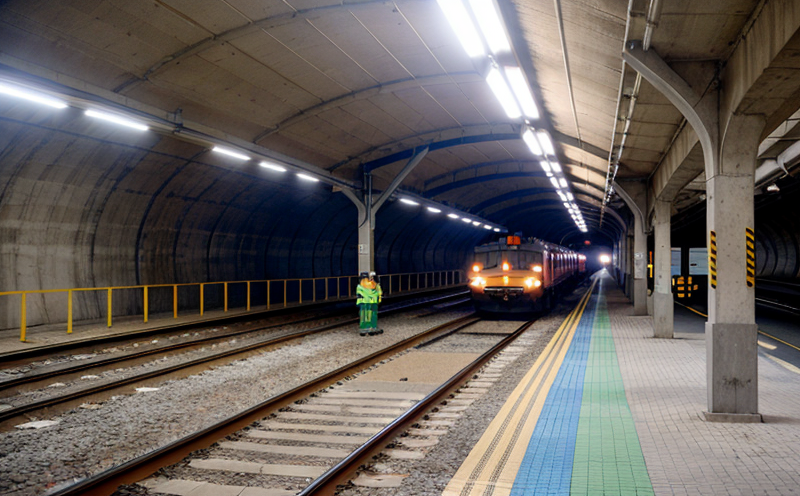EN 13146 Rail Fastening Electrical Resistance Testing in Tunnels
The European standard EN 13146-5 specifies electrical resistance testing for rail fastenings used within tunnels. This standard is crucial for ensuring the safety and integrity of railway infrastructure, particularly where metal structures are exposed to humid or corrosive environments.
Electrical resistance testing in tunnels focuses on assessing the galvanic corrosion risk associated with rail fastening systems. The primary concern here is the potential for galvanic coupling between dissimilar metals leading to localized corrosion that can compromise structural integrity over time. By measuring electrical resistance, we can evaluate the effectiveness of anti-corrosion measures and determine if there are any areas requiring remediation.
The testing process typically involves several key steps:
- Identification of metal fasteners used in tunnel structures
- Selection of appropriate test specimens reflective of real-world conditions
- Application of a standardized electrical resistance measurement technique
- Evaluation against EN 13146-5 acceptance criteria
The standard provides detailed guidelines on how to conduct these tests, including the use of specific equipment and methodologies. It ensures that testing is consistent across different regions and organizations, thereby enhancing reliability and comparability.
Real-world applications of this test are vast; it can be used during initial installation assessments or as part of routine maintenance programs. For instance, if new tunnel segments are being constructed, EN 13146-5 compliance is often a mandatory requirement to secure permits from regulatory bodies like the European Railway Agency (ERA).
Moreover, this type of testing plays an essential role in reducing insurance costs for railway operators by identifying potential corrosion hotspots early on. It also supports ongoing efforts towards sustainable infrastructure development by promoting longer-lasting solutions.
In summary, EN 13146-5 is a critical tool in the arsenal of quality assurance professionals responsible for maintaining safe and reliable rail transport systems worldwide. Its importance cannot be overstated given today’s increasing focus on green transportation initiatives which aim to minimize environmental impact while enhancing public safety.
Scope and Methodology
| Aspect | Description |
|---|---|
| Testing Environment | Tunnels, particularly those with metal structures exposed to humid or corrosive conditions |
| Type of Fasteners | Metal rail fastenings used in tunnel structures |
| Test Specimen Selection | Reflective specimens chosen based on actual usage scenarios |
| Evaluation Criteria | Accuracy and precision of electrical resistance measurements conforming to EN 13146-5 specifications |
The methodology outlined in EN 13146-5 requires precise measurement techniques to ensure accurate results. This includes considerations such as the positioning of electrodes, duration of testing, and environmental factors that might affect readings.
For instance, careful calibration of instruments is essential before starting any tests. Additionally, ensuring consistent humidity levels within the test area can significantly influence outcomes since moisture plays a pivotal role in galvanic corrosion processes.
The standard emphasizes the importance of replicating real-world conditions as closely as possible during testing. This ensures that findings from EN 13146-5 are applicable not just in laboratory settings but also in actual operational environments.
Eurolab Advantages
Our expertise lies in providing comprehensive services aligned with international standards such as EN 13146-5. At Eurolab, we pride ourselves on offering state-of-the-art facilities and experienced personnel dedicated to delivering top-notch testing solutions.
One major advantage of working with us is our unwavering commitment to accuracy and reliability in every test conducted. Our ISO/IEC 17025 accredited laboratories ensure compliance with strict quality assurance protocols, which guarantees that all results are trustworthy.
We understand the importance of timely delivery when it comes to meeting project deadlines. Therefore, we strive to offer fast turnaround times without compromising on quality. Our dedicated team works closely with clients throughout the entire process—from initial consultation through final reporting—to ensure smooth operations and successful outcomes.
Furthermore, Eurolab leverages advanced technology and cutting-edge methodologies to stay at the forefront of industry best practices. This enables us to deliver innovative solutions tailored specifically to each client's unique needs.
Competitive Advantage and Market Impact
- Comprehensive understanding of EN 13146-5 requirements
- Access to world-class laboratory facilities
- Experienced staff specializing in railway & transportation testing
- Pioneering use of latest technologies for enhanced accuracy
- Rapid turnaround times without sacrificing quality
- Strong reputation built on reliability and consistency
- Compliance with international standards ensuring global acceptance
These advantages position Eurolab as a leader in the field, offering unparalleled services that contribute significantly to both operational efficiency and safety within the railway sector.





